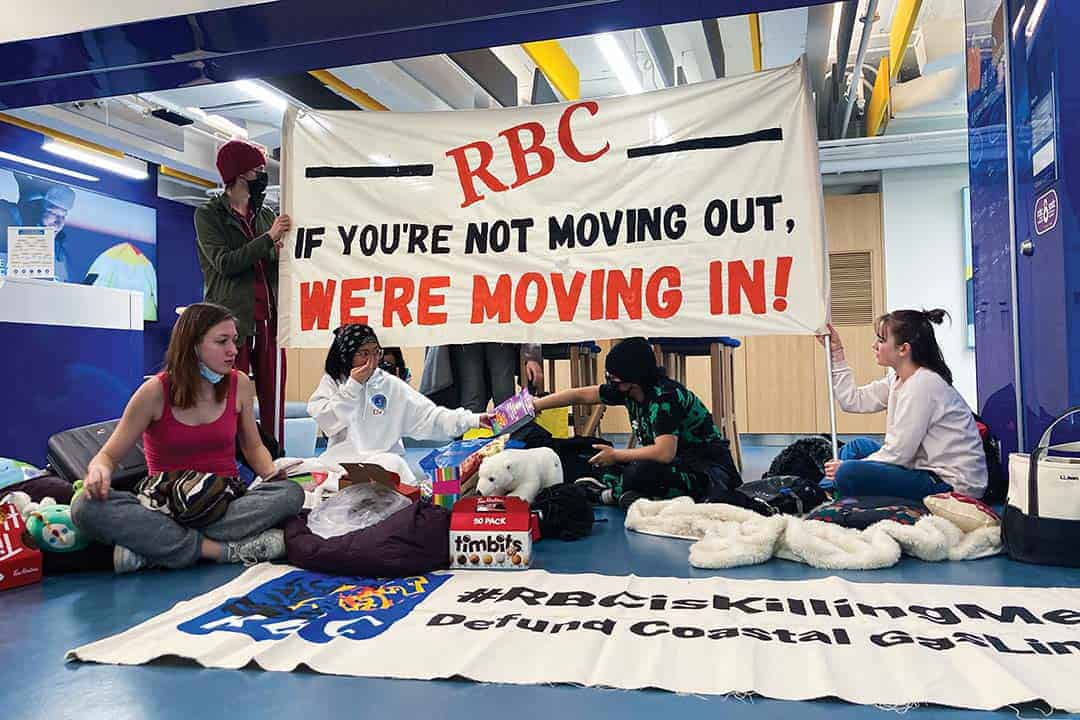The climate crisis is breaking every record, with students and communities being displaced by fires and people across Canada choking in the smoke. We — Climate Justice UofT — are breaking records too. In the past year, over 200 students have joined the fight for climate justice, and we have a lot to show for it.
In March, the University of Toronto Students’ Union announced that it would not renew its lease with RBC, which will lead to the company’s eviction from campus as of 2026. Years of student action culminated in the occupation of the Victoria College building (Old Vic), and resulted in Victoria University, St. Michael’s College, and Trinity College committing to divesting from fossil fuels.
While this is a year to celebrate, there is also a lot to mourn. Indigenous communities across Canada continue to be displaced by pipelines and other fossil fuel extraction projects that risk contaminating water and food, harming human and non-human communities. Tar sands workers too continue to face excruciating and hazardous working conditions.
It is not just them. Workers across Canada are facing the brunt of the climate crisis as they are forced to work outside during dangerous heat and smoke full of harmful pollutants. For many of these workers, the injustice is doubled because poor communities tend to have higher levels of air pollutants like PM2.5, a type of particulate matter.
We must make space for this grief and centre it in the work that we do. Most importantly, we must remember who caused this: the fossil fuel industry and its accomplices. We will not regret being intolerant toward these corporate actors destroying our communities; we will only regret being too tolerant.
We are too tolerant of the consultants and financial experts governing U of T, casually weighing human lives against profits, and partnering with banks like RBC as they destroy our communities. We must draw a line in the sand and be willing to ask: whose side are you on?
Fossil free research
U of T continues to accept fossil fuel funding for climate research and energy centres. Notably, the Climate Positive Energy group of U of T held the Climate Economy Summit in November, sponsored by Imperial Oil, Enbridge, and RBC — 2022’s largest fossil fuel financier in the world. The conference included panellists from RBC to discuss financing the growing economy while reducing emissions.
Do we really believe that if the conference was on ending colonial extraction or degrowth, Imperial Oil would still be interested? Fossil fuel financing elevates ideas such as carbon capture and carbon markets over climate solutions that are less profitable for the private sector and the fossil fuel industry. We have data to back this up. For example, a recent study found that academic energy centres — which lead policy discussions on energy transition — funded by fossil fuel companies tend to favour natural gas over renewable energy.
We are in the middle of a climate crisis caused by the fossil fuel industry. The polluters raking in profit on the backs of the crisis will never solve it. We cannot afford their dangerous promotion of false solutions. We cannot afford fossil fuel money. U of T must put an end to this.
Neoliberalism and false solutions
The problem is much deeper than fossil fuel money. U of T itself is peddling the dangerous lies about climate change that are promoted by the fossil fuel industry. In March, U of T announced its new carbon offsetting program for faculty members’ flights. The idea was that for every flight by a faculty member, U of T would buy an equivalent number of offsets to offset the emissions. The problem: carbon offsets are scams.
The original idea behind carbon offsets was to create a market where people could buy and sell “carbon credits” as a way to address the negative externality of carbon emissions. Obviously, the solution to a problem capitalism created must just be more capitalism.
The problem is that carbon emissions do not work like gold or apples or iPhones. We don’t have any scalable method to remove carbon from the atmosphere. Most carbon offsets are not from carbon dioxide removal, but rather renewable energy generation, planting trees, and a myriad of other nature-based solutions.
Carbon offsets often fail to deliver the promised emissions reductions, and most of these reductions are temporary. Carbon markets have also been heavily criticized by Indigenous land defenders, such as Indigenous Climate Action, as false solutions encouraging the privatization and theft of Indigenous lands to sell as offsets.
U of T peddling these false solutions to frame itself as a sustainability leader is dangerous and disappointing. This harms everyone. The school is using its reputation to launder these ideas into the mainstream.
The truth is that the harm and destruction that fossil fuels cause frontline communities cannot be offset. If U of T wants to be a sustainability leader, it should act like one and help us chart a different course. For example, as Professor Jessica Green points out, U of T could use the money it is spending on carbon offsets to offer free public transit for students, faculty, and staff.
U of T is obsessing over its reputation, while tens of thousands of Canadians — some of them U of T’s own students — were evacuated this summer for wildfires. Neoliberalism is a fire that’s spread through every part of the U of T administration. And if we are not careful, it will burn it all down.
Amy Mann is a third-year student at Victoria College studying mathematics and health studies. She is a member of Climate Justice UofT.



No comments to display.